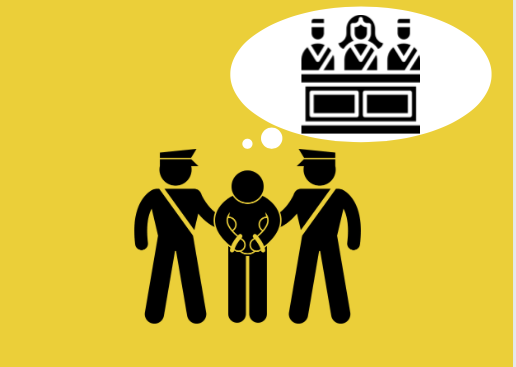A capital offence is one that carries a maximum sentence of death and is handled by a judge of the High Court. Examples of such offences include; Murder, Aggravated Robbery, Aggravated defilement, Rape among others. A person that has been charged with a capital offence is called a capital offender or an accused person.
After the accused person has finally been listed for trial or if their name has finally been put on the list for a High Court Session, the case will proceed as follows;
- The accused persons listed for the session are informed.
- Court will inform lawyers that are available to represent the accused on State brief. These are usually paid by the government. However, the accused person has a right to get a private Lawyer of their choice.
- The Lawyers will proceed to prison where the accused person is detained, purposely to interview their client(s) (the accused persons) and get their side of the story.
- The prosecution (state attorney) and the lawyers of the accused persons exchange documents to be sure which evidence each is bringing to court including the number of witnesses that will testify.
- On the day of the hearing, the Prosecution opens its case by calling its witnesses to testify, the first witness being the complainant (the one that reported the case). (Note: Sometimes prosecution and defence is given an opportunity to make opening statements, this is done before hearing of witnesses).
- All these witnesses are cross-examined by the defence lawyer (lawyer of the accused).
- Once all the prosecution witnesses are heard, the prosecution will close its case.
- Before the accused person is put to his/ her defence, the court will have to rule as to whether he/ she has a case to answer. Having a case to answer means there is enough evidence presented by the prosecution that requires answers from the accused. If there is no case for the accused to answer, the accused person will be acquitted/ released at this stage. This will mean that the prosecution has not proved its case. If the court, however, rules that the accused has a case to answer, he/ she will be put on their defence.
- The accused person will testify and so will his / her witnesses if available.
- These witnesses will also be cross-examined by the prosecution Lawyer many times called the State Attorney.
- The defence will then close its case and a date will be given as to when the judgment will be read. Such a date is usually communicated on notice to both the accused person’s lawyers and the prosecutors.
- The judgment is finally read. If the accused is found innocent, he/ she will be acquitted and set free and if he/ she is found guilty, the court will have to give an appropriate sentence for the accused.
- But before this is done the Lawyer for the accused or the accused person will have to mitigate the sentence. Here the lawyer asks court for a lenient sentence based on some factors e.g. The time the accused has spent on remand, his/ her remorsefulness/ regret, sickness if any, family responsibilities etc.
- An appropriate sentence is given and the accused person is committed to prison to serve his/ her sentence.
Note that in High Court Trials the judge is supported by Assessors. Assessors can give an opinion regarding whether or not they believe the accused is guilty given the evidence presented. The opinion of the Assessors does not bind the Judge in any way and the Judge may depart from it, giving his or her reasons why.
Role of Justice Centres Uganda in Capital offences
- JCU helps in applying for bail for the accused person.
- Representing the accused person on state briefs.
- Giving basic legal advice to the family members of the accused person.
Further Readings:
What happens when a family member/ friend has been arrested by the police?
What is Police Bond and who has the mandate to grant it?
What are capital offences and how are they handled?
What is the process of hearing a petty offender’s case in the Magistrate’s Court?
What happens when someone is arrested for committing a petty offence?
What is bail and what is it good for?
When and how to apply for Bail in High Court?
When and how to apply for Bail in a Magistrate’s Court?
What is plea bargain and what is it good for?
Sources of information
- The Constitution of the Republic of Uganda 1995
- The Trial on indictment Act Cap
- The Criminal Procedure Code Act Cap 116
- The Magistrates Court Act Cap 16
- The Magistrates Courts (Magisterial Areas) Instrument 2017
- The Judicature (Plea bargain) Rules 2016

